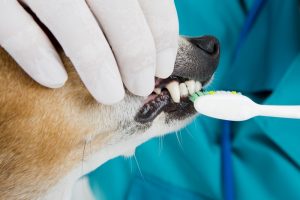
85% of cats and dogs will suffer from periodontal disease at some stage in their life
Did you know that your pet’s teeth are extremely similar to yours? Their baby teeth will fall out, they’re at risk of developing tooth and gum diseases and they need to have a check-up once a year.
Animals are particularly good at tolerating tooth and gum pain, which means that your pet could have a dental disease that you don’t know about.
If you don’t care for your pet’s mouth on a regular basis plaque can begin to build on their teeth. This will lead to brown-yellow scales known as tartar; tartar is accompanied by bad breath. Eventually, tartar will lead to other bacteria which cause disease. This is known as periodontal disease. Once your pet has this disease their teeth can fall out, and the infection could spread to your furry friend’s organs.
At Skibbereen Veterinary Clinic we recommend that you monitor your pet’s mouth regularly. Signs that your pet could have a dental problem include:
- Avoiding eating or difficulty eating such as chewing on one side of the mouth
- Red gums, brown-yellow scales on the teeth, pus pockets on the gums Your pet pawing at their mouth
- Blood in your pet’s saliva
- Subdued behaviour such as a reduction in grooming
If your pet is demonstrating one or more of the symptoms above you should bring them to see us as soon as possible. The quicker a tooth or gum infection is diagnosed, the more likely effective treatment is.
The best way to prevent your pet from developing a dental problem is to take a proactive approach from when they’re a baby. You should brush your pet’s teeth regularly with specialist animal toothpaste that doesn’t require water and causes no harm if swallowed.
A dry or partially dry diet is also recommended. Chewing causes hard, rough biscuits to rub against your animal’s teeth acting as a cleaning device.
When you bring your pet to Jerry Mc Carthy Veterinary Clinic for their annual check-up they will have their teeth thoroughly examined. This is to check for any signs that they could be suffering from a tooth or gum disease.
There may be a stage in your pet’s life when we recommended dental treatment under anaesthetic. Depending on the age and health of your pet, we may also require a pre-anaesthetic blood test.
Once your pet is asleep a veterinary surgeon will check each tooth extensively for problems such as mobility, deep pockets around the teeth, exposed roots, and tooth decay.
Some problems we see at Jerry Mc Carthy Veterinary Clinic can be reversed by scaling (removing the tartar) and additional care at home. However, if the problem is found to be too advanced, a single tooth or multiple teeth may need to be removed.
If you would like more information about animal dental health, or to book your pet in to have their teeth examined by a veterinary professional, please don’t hesitate to get in touch.
To have your pet cared for at the clinic, please don’t hesitate to get in touch. You can contact us by calling 028 23000 or 086 8535358. You can also get in touch via email at When your pet is due their check-up you want to know that they’re in the very best hands. You want to rest assured that no aspect of their health is going to be missed.
At Jerry Mc Carthy Veterinary Clinic your pet can look forward to an extensive check-up to ensure that they are happy and healthy. The vet will begin by checking the basics including the eyes, ears, skin, teeth and coat. Your pet will then have their heart and lungs listened to, before having their abdomen examined for any indication of problems.
Once the vet has finished examining your pet you will be given plenty of time to ask any questions you may have. We pride ourselves on the time we are able to spend with each of the pets we see, and believe it is very important that you understand everything that you have been told by the vet.
Should your pet require medication once their consultation is complete, the vet will help you. As well as being able to process your pet’s prescription they will also give you some great tips on how to administer it.
To have your pet cared for at the clinic, please don’t hesitate to get in touch. You can contact us by calling 028 23000 or 086 8535358.
